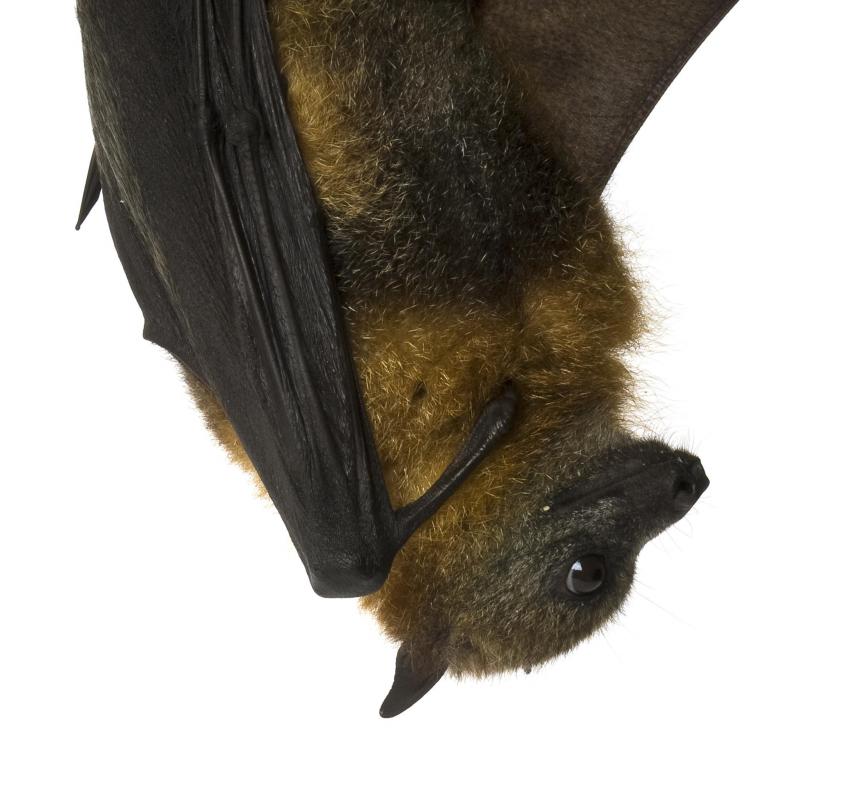At AllThingsNature, we're committed to delivering accurate, trustworthy information. Our expert-authored content is rigorously fact-checked and sourced from credible authorities. Discover how we uphold the highest standards in providing you with reliable knowledge.
What Are the Different Uses of Bat Saliva?
Saliva from some bats, particularly vampire bats, contains an enzyme that keeps blood from coagulating, or clotting. The main potential use for this saliva is as a medicine to break up blood clots in stroke patients. Injecting bat saliva into stroke patients may be as effective as the more commonly used stroke treatment, alteplase. Some studies have also shown that bat saliva may also work up to nine hours after a person has had a stroke, whereas alteplase can usually only be used up to about four hours afterward.
Known scientifically as Desmodus rotundus, the common vampire bat is a type of bat that feeds on the blood of other animals. Unlike mythical vampires, vampire bats do not suck blood; instead, they lick it up with their long tongues. To keep the blood flowing from the wound, a vampire bat will deposit some saliva into the wound.

Vampire bat saliva has an unusual enzyme that has very strong ant-clotting properties and also prevents nearby blood vessels from closing. Ischemic strokes happen when blood flow in the brain is blocked due to a blood clot, so researchers are studying whether this enzyme could help break up such clots. As of 2011, this stroke treatment was still being investigated, but scientists were hopeful that bat saliva could be used as a treatment for strokes by 2015.

Scientists have found that injecting a medication made from bat saliva directly into a stroke sufferer's bloodstream can help break up blood clots. This solution has been dubbed desmoteplase, after the scientific name of the common vampire bat. Some scientists believe that it may actually be more effective than the traditional medicine used to break up blood clots.
Using current stroke treatment methods, medical professionals generally have a little over four hours to inject alteplase into a patient's veins. After this time, this medication is usually not able to break up blood clots that cause ischemic strokes. The bat saliva medication, on the other hand, may still be effective even when injected into a stroke victim several hours later.
Alteplase also can cause very heavy bleeding in some patients, which can be very dangerous. Desmoteplase, on the other hand, seems to cause little or no side effects in most people. Studies currently suggest that it may be safer than alteplase.
Frequently Asked Questions
What is the medical significance of bat saliva?
Bat saliva has gained medical significance due to a protein called Desmodus rotundus salivary plasminogen activator (DSPA), also known as Draculin. This protein has anticoagulant properties, which means it can prevent blood clotting. It has been studied for its potential use in treating stroke patients by dissolving blood clots that can cause strokes, according to research published in the journal Stroke.
How is bat saliva used in stroke treatment?
Bat saliva is used in stroke treatment through a drug called Desmoteplase, which is derived from the saliva of the vampire bat. This drug helps dissolve blood clots in the brain of acute ischemic stroke patients, potentially restoring blood flow. Clinical trials have shown promise, with Desmoteplase demonstrating effectiveness when administered within a nine-hour window after stroke onset, as reported in the journal Blood.
Are there any FDA-approved drugs derived from bat saliva?
As of the last update, the FDA has not approved any drugs derived from bat saliva. However, Desmoteplase, a drug developed from a component of vampire bat saliva, has undergone various stages of clinical trials. It shows potential as a treatment for acute ischemic stroke and continues to be the subject of research and development for future approval.
What makes vampire bat saliva unique in medical research?
Vampire bat saliva is unique in medical research because it contains enzymes that are highly efficient at dissolving blood clots without damaging surrounding tissues. This is an adaptation that allows vampire bats to feed on the blood of their prey. The enzyme's specificity and efficiency make it an attractive model for developing thrombolytic agents in medicine.
Can bat saliva be used for conditions other than strokes?
While the primary focus of bat saliva research has been on stroke treatment, scientists are exploring its potential for other conditions related to blood coagulation and vascular health. Its anticoagulant properties may be beneficial in preventing deep vein thrombosis or myocardial infarction, but further research is needed to establish its efficacy and safety for these conditions.
Is the collection of bat saliva for medical research harmful to bats?
The collection of bat saliva for medical research is typically conducted in a manner that minimizes harm to bats. Researchers often extract saliva from captive bats under controlled conditions, ensuring that the bats are not harmed in the process. Ethical considerations are paramount, and conservation status is taken into account when studying wild populations.
AS FEATURED ON:
AS FEATURED ON:












Discuss this Article
Post your comments